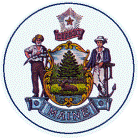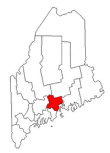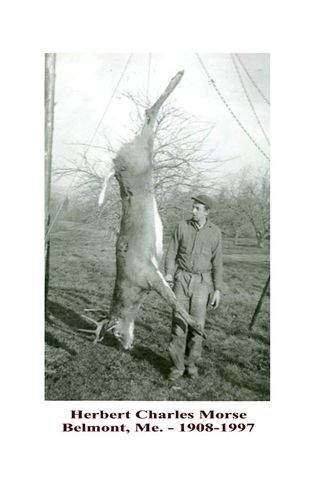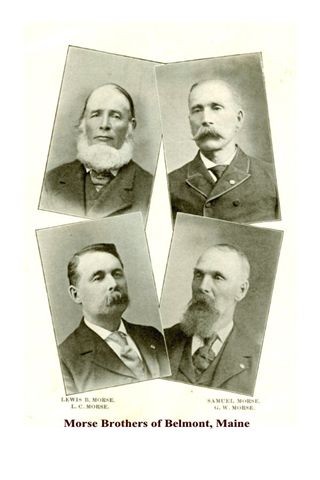
Lucius
lay in a sick-bed at the home of his
son, prominent Belfast attorney, Ralph
I. Morse. The surroundings were not at
all familiar as Lucius opened his
eyes, after a long illness. So many
winters had passed, and he knew that
as another winter approached, he would
not live to see the snow.
He
recalled his early life on the farm in
the town of Belmont, Me. where he was
born in 1845, on the sixty-acre farm
settled by his father. He was the son
of Barnard and Mary Ann (Fales) Morse.
Barnard
had settled in the fledgling town of
Belmont shortly after the Town
incorporation in 1820, coming from
Union, Me. Soon after coming to
Belmont, Barnard moved to
Lincolnville, where he was in the lime
business.
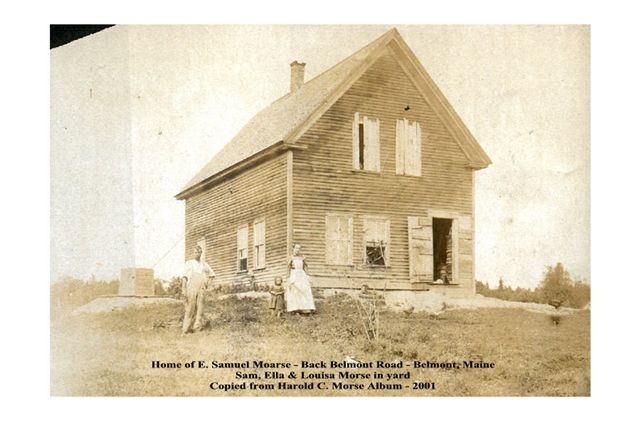
Barnard
returned to the farm in the lower
section of Belmont. He and Mary Ann
had six sons and two daughters.
Barnard and his sons built a stone
sawmill near the outlet of Tilden
Pond.
Life
on the farm in Belmont was busy. The
boys worked hard on the farm, as well
as in the saw-mill. They farmed with
an ox team, tilling the soil, picking
rocks, building stone walls, planting
and harvesting gardens in season,
‘slopping’ the hogs, milking cows,
getting in the hay in the heat of
summer, logs for the sawmill and
firewood for the winter.
The
farm was pretty much self-sufficient,
even producing a field of wheat,
milling it into flour for daily bread.
Mother ‘set’ the milk, skimmed the
cream, and made butter for use and to
trade at the store. She kept her
butter and food cold in the spring
that furnished water for the house and
barn. She had a flock of hens for
eggs. She worked hard keeping the
family clean, fed and clothed.
Barnard
and his sons were avid trappers and
hunters. They hunted game birds,
rabbits, bear, moose and deer. By the
1850’s, besides using the meat for
their own larders, they sold wild meat
in the Boston markets, taking the
train from Belfast, with a large
dressed moose, deer or fowl. They
would ride the train with the meat,
finding the best prices at markets
when they arrived in Boston.
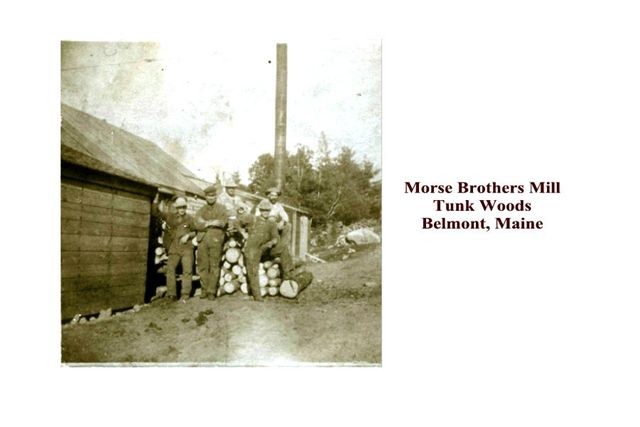
Barnard and the boys sawed out lumber
for the red schoolhouse that the
children attended. The school mistress
boarded in their home.
Lucius
recalled that he went to sea at the
age of fourteen, working the coastal
trade in the summer. He worked
lumbering with his father and brothers
during the winter months.
In
April of 1862, when he was sixteen
years of age, Lucius was in Havana,
Cuba on a coastal ship where he saw
blockade runner ships arriving daily,
loaded with cotton and defiantly
flying the Confederate flag. The sight
aroused in him a spirit of loyalty to
the Union. When he arrived home in
Belmont, he told his brothers what he
had seen.
Lucius
enlisted in the Army as soon as he got
home. His older brothers had enlisted.
Because Lucius was only sixteen, he
needed his parents’ permission to
join. His mother was reluctant to
allow him to go to War, saying he was
too young.
In
Sept. 1862, a special Town Meeting was
held in Belmont after a call to raise
a quota of men for enlistment. Lucius
had implored his parents to let him
go. He and his friend, David P. Ordway
were the first to step forward for
enlistment. His grieving father and
mother allowed him to leave with his
brothers in Company B of the
Twenty-Sixth Regiment of Maine
Volunteers.
In
March 1863, General Birge at a dress
parade at Baton Rouge, La. gave a
compliment that Corporal Lucius Morse
was the best drilled man in the manual
of arms in the Regiment. It was
thought that the boys were well-known
as brothers in the same Regiment.
In
April 1863, after the battle of Irish
Bend, Lucius came down with malarial
fever. He was left at Jackson’s
Barracks Hospital at Baton Rouge, La.
He suffered from chronic diarrhea,
which was fatal in some soldiers with
fever. He was unconscious for some
days, and was at the Hospital for six
weeks. Also at the Hospital, Samuel
had recovered from the fever and Lewis
had been wounded. They kept their
promise to their mother, tending their
youngest brother Lucius with love and
care. At times they doubted that their
brother would survive, and he might
well not have without their care.
They
rejoined their Company in July 1862 at
Port Hudson. The Regiment was mustered
out August 17 of that year.
George
W. Morse was one of the men who
enlisted while Belmont was filling its
quota. He served a year, and was known
as a crack sharpshooter. He received
an honorable discharge. After
returning home, when a draftee ran
away, George was sent back into the
service by a second draft. This time
he served in the Eighth Maine Regiment
where he served until the end of the
War.
George
W. married Hester McLain. He was a
farmer, and held a Commission as a
Justice of the Peace, marrying many
local couples. He was a quiet man,
firm in his opinions when he knew he
was right. He was active at Mystic
Grange in his home town, and at the
Temple Heights Spiritual Campground in
Northport, Me., and the Thomas H.
Marshall Post, Grand Army of the
Republic.
About
1877, George W. went to California in
the lumbering business, leaving his
four sons, sixteen years of age and
younger, to carry on the farm. He was
an active worker wherever he was
needed, and a lifetime citizen of
Belmont, Me.
Lewis
Bradford Morse was a farmer, residing
in Searsmont with his wife, Mary. He
was thirty-seven years old at the time
of his enlistment in the Army. He was
married when he enlisted and had three
children at the time. He was sick with
fever at Baton Rouge before Lucius’
sickness. He had been wounded on his
face near his eye. Lewis’ three
daughters died of diphtheria. Two
sons, Henry and Lewis Leroy, grew to
adulthood and had families.
Samuel
was aged twenty-seven years when he
enlisted. He was a Sergeant in Co. B.
of the Twenty-Sixth Regiment Infantry.
He was sick at Baton Rouge and had
been wounded in the right elbow. He
had married Lovina Harding before his
enlistment. They had one daughter,
Emma. Samuel and Lovina divorced in
1886. He married in 1889 to Isabella
Poor of Belmont. In 1895 he built a
new house in Belmont, getting out
lumber from his property for the
house.
In
1896, Morse Brothers of Belmont
purchased a rotary saw for their steam
mill to saw all kinds of long and
short lumber, shingles, barrel staves
and heading.
Leander
was born in 1826, while his father was
in the lime business. Leander’s
siblings had been born in Belmont, but
he was born in Lincolnville. He sailed
from Gloucester, Mass. in the fishing
fleets for many years. After living in
Belmont for most of his life, he and
his wife, Sarah Jane (Swift) resided
on Congress Street in Belfast, Me.
William
Bradford served in the First Cavalry
during the Civil War. As William and
Leander had not served in the same
company as the four brothers, their
service was not so much publicized.
William married Abbie hart. He and
Abbie were well-known as being active
in the Spiritualist circles at Temple
Heights Campground in Northport, Me.
Abbie was a medium as well as being a
speaker. They had one son. William
“was a good citizen and respected by
all who knew him.”
Lucius
recalled his life after the War. He
had married Delia Neal of Morrill.
They had two daughters who died young
and his son, Ralph. He and Delia had
moved to Liberty, Me. where he was a
well-known businessman. He owned and
operated a wood-turning and planing
mill in Liberty. His company built
caskets. He was an undertaker, having
establishments in three towns. He
became a U. S. Pension Examiner,
helping many local veterans obtain a
Pension for their service in the Civil
War. He was on the Board of the Maine
State Reform School. In 1889, he was a
member of the Maine House of
Representatives, and served as a State
Senator for Waldo County, known for
his good judgment. He was a life-long
Republican, President of the Waldo
County Agricultural Society, Master of
Georges River Grange, on County and
Town Republican committees and a
President of the Twenty-Sixth Maine
Regimental Association, as well as
being a Town of Liberty selectman and
assessor.
Lucius
mused over his life as the last
surviving member of his immediate
family. The brothers had always been
thankful, as was their mother, that
they had all returned from the War.
His sister, Mary Ann died in 1872;
Father died in 1877, Mother in 1888,
William in 1897, George W. in 1904,
Lewis in 1907, Leander in 1911 and
Samuel in 1915, making him the sole
survivor of the family.
Lucius
Chandler Morse went to be with his
family on Wednesday, Nov. 12, 1924 in
Belfast, Me. after suffering for some
years, aged seventy-nine years, at the
home of his son, Ralph, the last of a
hard-working, industrious, patriotic
family of Belmont, Me. The Morses of
Belmont leave many descendants across
the State and Country.

